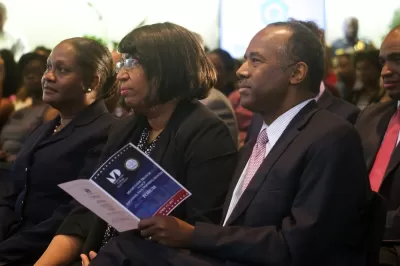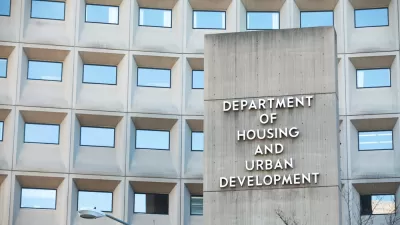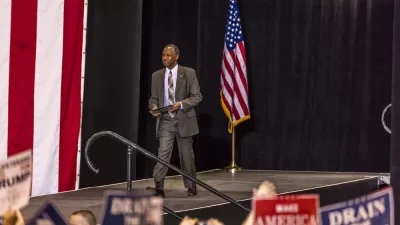Observers have been pointing out the contradictions in Secretary Ben Carson's justifications for a new approach to the Fair Housing Act.

Writers have been quick to produce commentary after news broke earlier in the week that the U.S. Department of Housing and Urban Development (HUD) had launched a rulemaking process to rewrite the Affirmatively Furthering Fair Housing (AFFH) rule approved by the Obama administration in 2015.
Henry Grabar writes for Slate, describing the action is the "firmest commitment yet to tear down the Obama-era framework for enforcing the Fair Housing Act."
Mostly, however, Grabar points out the contradictory frame HUD Secretary Ben Carson has built around his case for drawing back the AFFH rule. While Carson makes the case that the AFFH rule has made affordable housing scarcer, fair housing experts say the rule was designed to combat segregation and discrimination, not scarcity.
While Carson is on the record saying he wants to encourage development of middle-income multi-family dwellings, Grabar doesn't have to look far in Secretary Carson's past to find evidence that comment is misleading. "In his only published commentary on housing policy before his appointment to HUD, he called the 2015 AFFH rule “social engineering” that would 'fundamentally change the nature of some communities from primarily single-family to largely apartment-based areas.'"
Grabar's take: no matter how Secretary Carson justifies the need for this policy, he's pursuing the rule change for the AFFH in accordance with a traditionally conservative approach to land use and fair housing regulations, "which is to reject federal efforts to demolish the walls that wealthy white suburbs have built."
Dominique Mosbergen also followed up the news of the proposed rulemaking process by quoting Sara Pratt, a civil rights attorney and former Obama official who oversaw HUD’s enforcement of the rule and is now suing HUD for failing to implement the AFFH rule. "You’re going back to communities willfully blinding themselves to patterns of segregation," Pratt told NBC News. "Without this rule, communities will not do the work to eliminate discrimination and segregation."
Finally, Brakkton Booker also reported on the rulemaking announcement, noting that HUD will be holding "informal listening forums will be held to get input from city planners, public housing authorities, housing advocates authorities and other stakeholders on the pending rule change."
FULL STORY: Ben Carson Ends Obama-Era Efforts to Reduce Housing Segregation

Planetizen Federal Action Tracker
A weekly monitor of how Trump’s orders and actions are impacting planners and planning in America.

Restaurant Patios Were a Pandemic Win — Why Were They so Hard to Keep?
Social distancing requirements and changes in travel patterns prompted cities to pilot new uses for street and sidewalk space. Then it got complicated.

Map: Where Senate Republicans Want to Sell Your Public Lands
For public land advocates, the Senate Republicans’ proposal to sell millions of acres of public land in the West is “the biggest fight of their careers.”

Orange County, Florida Adopts Largest US “Sprawl Repair” Code
The ‘Orange Code’ seeks to rectify decades of sprawl-inducing, car-oriented development.

Maui's Vacation Rental Debate Turns Ugly
Verbal attacks, misinformation campaigns and fistfights plague a high-stakes debate to convert thousands of vacation rentals into long-term housing.

San Francisco Suspends Traffic Calming Amidst Record Deaths
Citing “a challenging fiscal landscape,” the city will cease the program on the heels of 42 traffic deaths, including 24 pedestrians.
Urban Design for Planners 1: Software Tools
This six-course series explores essential urban design concepts using open source software and equips planners with the tools they need to participate fully in the urban design process.
Planning for Universal Design
Learn the tools for implementing Universal Design in planning regulations.
Heyer Gruel & Associates PA
JM Goldson LLC
Custer County Colorado
City of Camden Redevelopment Agency
City of Astoria
Transportation Research & Education Center (TREC) at Portland State University
Camden Redevelopment Agency
City of Claremont
Municipality of Princeton (NJ)





























